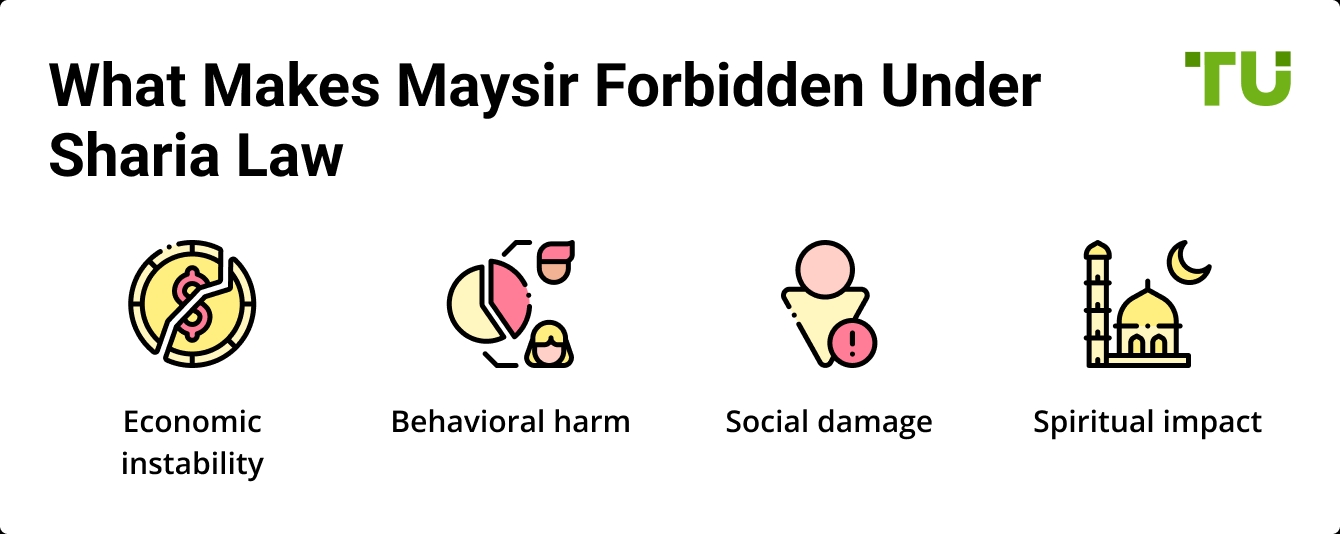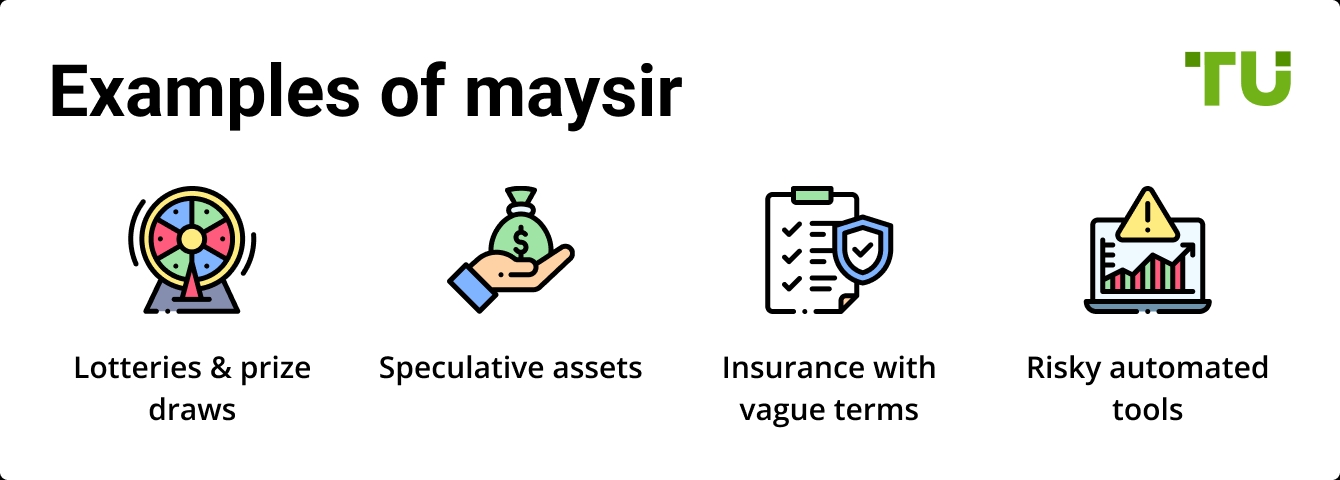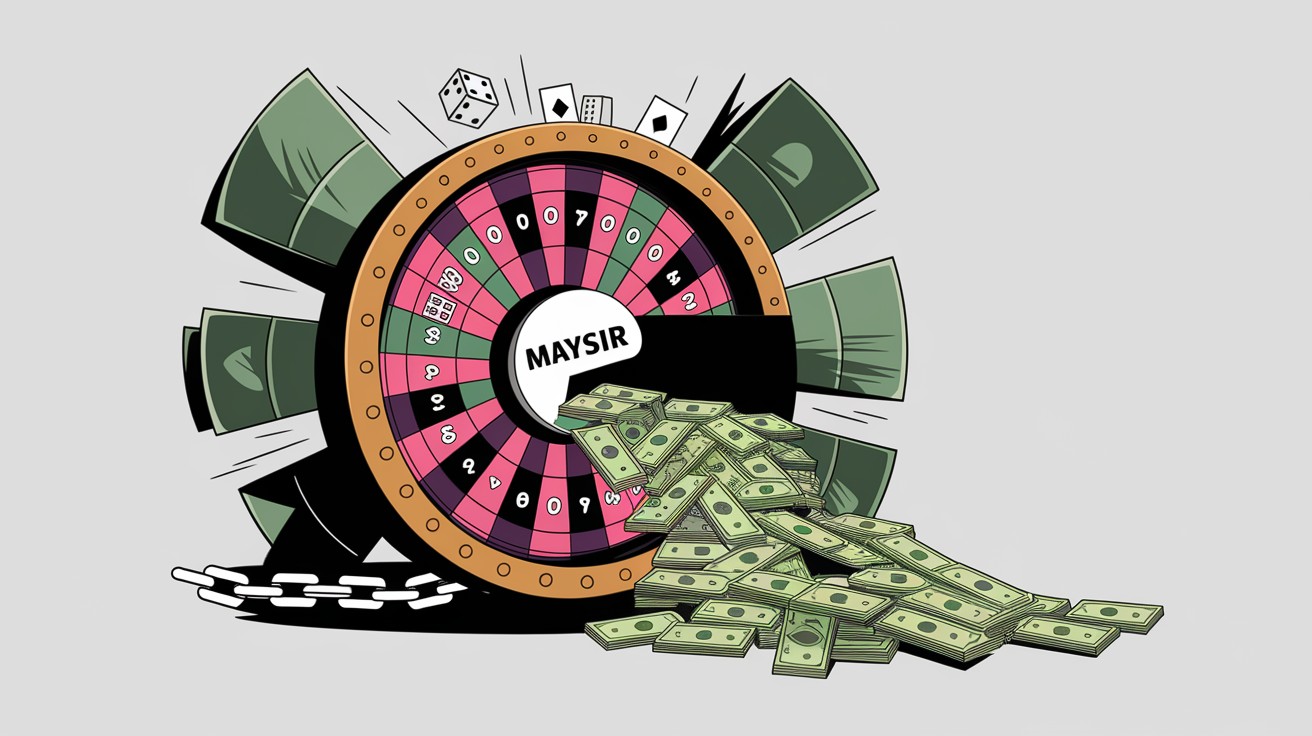Maysir In Islamic Finance: Meaning, Risk, And Prohibition



Editorial Note: While we adhere to strict Editorial Integrity, this post may contain references to products from our partners. Here's an explanation for How We Make Money. None of the data and information on this webpage constitutes investment advice according to our Disclaimer.
As per Islamic Finance, maysir refers to gambling or any transaction where wealth is acquired by chance, without effort or legitimate exchange. It is prohibited due to its potential to cause economic instability and personal harm. Examples include lotteries, casino games, and speculative investments that rely solely on luck rather than productive activity.
Maysir is a fundamental concept in Islamic legal and financial thought. It refers to any involvement in transactions where gain or loss is based on an unpredictable outcome rather than effort, knowledge, or legitimate risk. The question what is maysir in Islam is closely tied to the prohibition of practices that undermine economic fairness and promote speculation. Understanding maysir meaning in Islamic finance, is especially relevant for those engaged in trading, investing, or insurance, where the line between permissible risk and forbidden uncertainty can be subtle. The presence of maysir in a contract renders it invalid under Sharia and disqualifies the resulting income from being halal. This article explores how to identify elements of maysir in Islamic finance and maysir in Islamic banking, along with practical steps to avoid them.
Risk warning: All investments carry risk, including potential capital loss. Economic fluctuations and market changes affect returns, and 40-50% of investors underperform benchmarks. Diversification helps but does not eliminate risks. Invest wisely and consult professional financial advisors.
Definition of maysir in Islam

Maysir (مَيْسِر) is a well-established legal concept in Islamic jurisprudence, referring to the acquisition of wealth without equivalent countervalue, based solely on chance or uncertain outcomes. In Islamic finance, maysir has a specific meaning, which covers any scenario in which one party gains at the expense of another through mechanisms lacking fairness, transparency, or mutual exchange. This includes lotteries, betting, random draws, and any form of gaming where outcomes are not tied to skill, effort, or legitimate risk-sharing.
To illustrate what is maysir in Islam, scholars often reference a pre-Islamic game involving arrows, where participants contributed money and a randomly selected winner took the entire pool. This practice was deemed unjust because the outcome relied entirely on chance rather than merit or contribution — perfectly fitting the definition of maysir.
Contemporary scholars emphasize that maysir meaning in Islam extends beyond traditional gambling to include modern financial instruments involving high levels of uncertainty, speculation, and one-sided risk exposure. Any transaction in which one party stands to gain while the other bears loss — especially where the outcome is unpredictable and beyond the control of either side — may fall under the category of maysir in Sharia.
The prohibition of maysir in Islamic law
The prohibition of maysir in Islam is firmly grounded in direct Qur’anic revelation, giving it the highest level of authority within the Islamic legal system. In Surah Al-Baqarah (2:219), Allah acknowledges that while there may be some perceived benefit in gambling, its harm — both socially and spiritually — far outweighs any possible gain, rendering it impermissible regardless of form, scale, or intent.
Surah Al-Ma’idah (5:90–91) delivers a more categorical statement, placing maysir alongside intoxicants, idolatry, and divination as abominations from the works of Satan. The verse warns that these activities are designed to sow hatred and enmity among people and to distract them from the remembrance of Allah and regular prayer. Thus, the prohibition of maysir in Islam is not only rooted in financial ethics but also in the protection of social cohesion and spiritual focus.
Prophetic traditions reinforce this prohibition with further clarity. The Prophet Muhammad (peace be upon him) condemned all forms of chance-based games involving prize transfers, even those that appeared trivial, if they involved risk to property without a legitimate basis. In Islamic teaching, lawful earnings must come through labor, trade, or clearly defined investments. Gambling gains, in essence, represent unlawful appropriation of wealth without just cause, violating the conditions of rightful ownership in Islamic law.
Contemporary scholars extend the prohibition of maysir in Islamic finance to include financial products that manufacture artificial risk for the sake of profit — particularly within digital assets, binary options, and certain forms of futures or speculative contracts. In this context, the rule against maysir functions as a universal principle that applies to both traditional and modern forms of unjust enrichment.
Reasons for the prohibition of maysir

The prohibition of maysir in Islamic law is based on its harmful effects on individuals and society. Unlike fair business risk, gambling relies on chance, fosters unequal outcomes, and undermines ethical earning.
Key reasons for the ban include:
Economic instability. Gambling exposes individuals and families to financial loss, eroding wealth and undermining responsible planning.
Behavioral harm. It encourages greed, impulsiveness, and irresponsibility while weakening self-discipline and rational decision-making. Social damage. Maysir creates zero-sum dynamics — every win is another’s loss — leading to conflict, mistrust, and division in communities.
Spiritual impact. It distracts from worship and remembrance of Allah, replacing faith-based discipline with addiction to uncertainty.
Islam forbids maysir not to restrict enjoyment, but to preserve fairness, financial stability, and spiritual integrity across all levels of life.
Maysir in Islamic finance
As per Islamic finance, maysir is viewed as a serious violation of Sharia principles, as it undermines the foundations of fairness, risk symmetry, and contractual transparency. Any financial product where one party stands to gain purely due to a random outcome — while the other bears risk without a justifiable basis — is deemed impermissible. Products or transactions containing elements of maysir in Islamic finance are not considered halal, even if they meet formal legal or regulatory standards.
A common example is conventional insurance with fixed premiums and predetermined payouts, especially when the payout amount is uncertain or tied to the occurrence of an unlikely event. This introduces ambiguity and disproportionate risk allocation. The Sharia-compliant alternative is takaful — a cooperative risk-sharing model in which participants contribute voluntarily to a pool and share liabilities collectively, without profit motives.
Maysir in Islamic banking can also emerge through speculative trading of non-asset-backed instruments. This includes derivatives such as futures, options, and contracts for difference (CFDs), particularly when used in short-term trading without the intent to take delivery of the underlying asset. These transactions often function as bets on market movement, aligning them closely with the essence of gambling.
Another form of maysir arises in asymmetric information scenarios, where one party lacks adequate knowledge of the risks or structure of a financial deal. If the other party exploits this gap for speculative gain, the transaction becomes ethically and legally questionable under Islamic law.
In this context, maysir in Islamic finance extends beyond traditional games of chance to include a broad range of complex financial mechanisms that distort equitable risk-reward distribution. For this reason, Islamic banks and investment institutions are required to conduct thorough Sharia reviews to ensure that financial products are free from maysir at the structural, operational, and contractual levels.
Examples of maysir in modern finance

Many financial products today contain elements of maysir, even if they appear legitimate. Key red flags include randomness, unfair risk, and profit without real value.
Common maysir examples:
Lotteries & prize draws. Paid-entry contests, SMS lotteries, and similar games rely purely on luck, with losers receiving nothing.
Speculative assets. Trading unverified cryptocurrencies or hype-driven tokens for quick gains mirrors betting, not investing.
Insurance with vague terms. Policies with unclear payouts or hidden exclusions may favor the insurer unfairly.
Risky automated tools. Gamified apps and high-risk algorithms that encourage impulsive trades without user understanding raise Sharia concerns.
Careful evaluation of intent, structure, and outcome is essential to avoid hidden forms of maysir.
Your safest bet for avoiding Maysir when trading or investing is by using Shariah-compliant brokers. And luckily, you don’t need to do the hard work here. We have already researched the market and presented the top Shariah-compliant brokers offering Islamic accounts in the table below. You can compare them and make a choice for yourself:
| Swap Free | Crypto | Stocks | Currency pairs | Min. deposit, $ | Regulation | TU overall score | Open an account | |
|---|---|---|---|---|---|---|---|---|
| Yes | Yes | Yes | 60 | 100 | FCA, CySEC, MAS, ASIC, FMA, FSA (Seychelles) | 6.83 | Open an account Your capital is at risk. |
|
| Yes | Yes | Yes | 90 | No | ASIC, FCA, DFSA, BaFin, CMA, SCB, CySec | 7.17 | Open an account Your capital is at risk.
|
|
| Yes | Yes | Yes | 68 | No | FSC (BVI), ASIC, IIROC, FCA, CFTC, NFA | 6.8 | Open an account Your capital is at risk. |
|
| Yes | Yes | Yes | 80 | 100 | CIMA, FCA, FSA (Japan), NFA, IIROC, ASIC, CFTC | 6.95 | Study review | |
| Yes | No | Yes | 50 | 200 | No | 1.97 | Study review |
The distinction between maysir and gharar
While maysir and gharar are both associated with uncertainty, they differ fundamentally in nature, scope, and legal implications within Islamic finance. Maysir refers to scenarios in which profit is derived directly from chance, where one party gains without contributing effort, value, or economic input. It represents gambling structures where outcomes are based on randomness and wealth is redistributed without underlying productive activity.
Gharar, on the other hand, deals with contractual ambiguity or uncertainty arising from unclear terms related to the subject matter, pricing, delivery time, or obligation. A common example of gharar is selling an item that does not yet exist or entering into an agreement without specifying key contractual elements. In such cases, one party commits to a transaction without full knowledge of what is being agreed upon, leading to potential injustice or exploitation.
The key distinction lies in the source of uncertainty: maysir is rooted in deliberate games of chance with known risk exposure, while gharar arises from informational gaps or vagueness in contract terms. Maysir involves a zero-sum setup where one party’s gain is directly linked to another’s loss. Gharar, by contrast, may occur even in sincere transactions if they lack clarity or structure.
From a Sharia perspective, both are prohibited, though they require different regulatory approaches. Maysir is eliminated through complete avoidance of speculative, game-based elements, while gharar may be tolerated in minor or unavoidable forms (gharar yasir), provided it does not distort the transaction’s core fairness.
Maysir and the gambling industry

The gambling industry is a commercial embodiment of maysir on a large scale, which fundamentally contradicts Islamic ethical and legal principles. It includes casinos, betting platforms, lotteries, slot machines, and their digital counterparts — such as online sports betting, fantasy games with entry fees, and pay-to-play mobile apps. All of these activities are structured around probabilistic outcomes where the gains of some are funded by the losses of others.
In Islamic jurisprudence, participation in such systems is viewed as a form of unjust wealth transfer. Unlike trade or investment — where both parties exchange value — gambling is outcome-dependent on chance, not real economic activity, making the resulting income impermissible under Sharia. This is why gambling is haram in Islam: it undermines fairness, promotes exploitation, and disconnects earnings from effort or value creation. For those asking, "Is gambling haram in Islam?" or "Is gambling allowed in Islam?" — the answer is clear through both ethical reasoning and religious rulings.
Furthermore, gambling in Islam and Quran are associated with significant moral and societal harms, including addiction, loss of self-control, family breakdown, and entrapment in cycles of debt. These risks are heightened in digital environments where reward systems — bonuses, level-ups, instant wins — are designed to encourage compulsive behavior.
Under Sharia, involvement in the gambling industry — whether as a player or provider — is strictly prohibited. The prohibition also extends to indirect roles, such as advertising, technical development, or platform integration, if they directly support or facilitate the spread of maysir-based services.
Avoid chance-based gains; focus on value-driven, fair finance
Most people think Maysir just means gambling, but here’s where it gets tricky: it’s not just casinos or poker tables. If you're trading crypto or Forex with extreme leverage or using apps that reward you for guessing price movements — you might be slipping into Maysir territory without even knowing it. Why? Because those setups don’t build real value. One side wins, the other loses, and it’s all based on chance. That’s exactly what Islam warns against. If you really want to stick to halal money practices, don’t just avoid gambling — look closely at how “fun” finance apps make money off uncertainty. If the whole thing feels like a game, it probably is.
Here’s another angle most people miss: Maysir can sneak into your everyday spending habits. Say you’re offered a lucky draw when you swipe your credit card or get pulled into a prize pool through a savings app. Feels harmless, right? But if the setup involves someone else losing so you can win, that’s the core of Maysir. The fix isn’t to run away from tech or innovation — it’s to pay attention to the structure behind the offer. Ask yourself: is this a fair system, or is it just dressed-up gambling? That one question can help you dodge Maysir without missing out on smarter ways to grow your money.
Conclusion
Understanding the concept of maysir is essential for Muslims seeking to conduct their financial affairs in line with Sharia. Islamic law rejects practices rooted in chance, unequal risk distribution, and speculation without real economic value. By avoiding maysir, individuals not only uphold religious obligations but also contribute to a responsible and transparent financial system. This is especially relevant in today’s digital economy, where gambling structures are often disguised as investments or entertainment. Sharia requires careful evaluation of every transaction — from profit mechanisms to contractual terms. Adhering to these principles strengthens personal discipline and promotes broader economic justice.
FAQs
Does a prize draw without an entry fee qualify as maysir?
If participation is free and not tied to a financial contribution, most scholars do not consider it maysir. However, if the cost is hidden in a product or service, it may require further evaluation.
Is it permissible to join investment pools with automated profit sharing?
If profits and losses are distributed proportionally and there are no guaranteed returns, such pools may be acceptable. What matters is transparency and the absence of speculative elements.
Is paying for a chance to receive a random “gift” considered maysir?
Yes, if the user pays for a chance to receive an uncertain prize of varying value, it resembles gambling. This setup falls under maysir due to the financial risk without guaranteed return.
What level of uncertainty is allowed in Islamic contracts?
Islam permits gharar yasir — minor uncertainty — if it does not affect the core elements of the contract. For example, flexible delivery times are acceptable, but price and subject matter must be clearly defined.
Related Articles
Team that worked on the article
Alamin Morshed is a contributor at Traders Union. He specializes in writing articles for businesses that want to improve their Google search rankings to compete with their competition. With expertise in search engine optimization (SEO) and content marketing, he ensures his work is both informative and impactful.
Chinmay Soni is a financial analyst with more than 5 years of experience in working with stocks, Forex, derivatives, and other assets. As a founder of a boutique research firm and an active researcher, he covers various industries and fields, providing insights backed by statistical data. He is also an educator in the field of finance and technology.
As an author for Traders Union, he contributes his deep analytical insights on various topics, taking into account various aspects.
Mirjan Hipolito is a journalist and news editor at Traders Union. She is an expert crypto writer with five years of experience in the financial markets. Her specialties are daily market news, price predictions, and Initial Coin Offerings (ICO).
An investor is an individual, who invests money in an asset with the expectation that its value would appreciate in the future. The asset can be anything, including a bond, debenture, mutual fund, equity, gold, silver, exchange-traded funds (ETFs), and real-estate property.
Forex leverage is a tool enabling traders to control larger positions with a relatively small amount of capital, amplifying potential profits and losses based on the chosen leverage ratio.
Cryptocurrency is a type of digital or virtual currency that relies on cryptography for security. Unlike traditional currencies issued by governments (fiat currencies), cryptocurrencies operate on decentralized networks, typically based on blockchain technology.
CFD is a contract between an investor/trader and seller that demonstrates that the trader will need to pay the price difference between the current value of the asset and its value at the time of contract to the seller.






























































































































